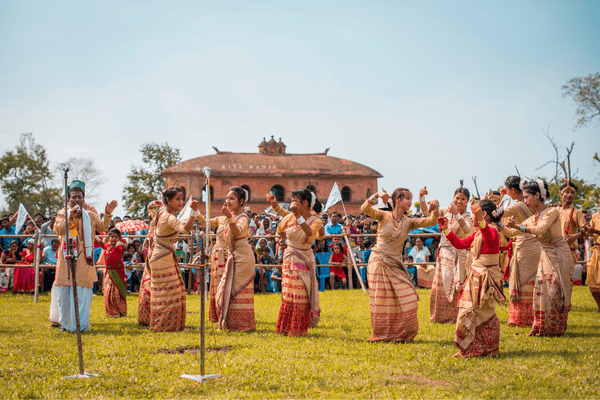Bohag Bihu, also known as Rongali Bihu or Xaat Bihu, is a significant cultural festival celebrated in Assam, marking the beginning of the Assamese New Year.
About Bohag Bihu:
- Bohag Bihu, also known as Rongali Bihu or Xaat Bihu, is a significant cultural festival celebrated in the northeastern state of Assam and other regions of northeastern India.
- The term “Rong” in Rongali Bihu translates to joy in Assamese, and this festival embodies the spirit of joy and happiness.
- It is observed by the indigenous ethnic groups of Assam and marks the beginning of the Assamese New Year.
- It coincides with the first day of the Hindu solar calendar and spring officially begins on this day.
- Bihu is a tri-annual festival, with Bohag Bihu being the first of the three.
- It is celebrated in the second week of April, signifying the onset of the seeding season.
- The other two Bihu festivals, Kati Bihu and Magh Bihu are celebrated in October and January, respectively.
- The Bhogali Bihu (Magh Bihu) is a harvest festival, with community feasts.
- The Kongali Bihu (Kati Bihu) is the sombre, thrifty one reflecting a season of short supplies and is an animistic festival.
Celebration:
- This festival is celebrated for seven days.
- The first day of the festival is called Goru Bihu, which means “cow worship”.
- The other days of the festival are Manuh Bihu, Guxai Bihu, Chot, Kutum, Mela, Raati, and Senehi.
Similar spring harvest festivals celebrated across India:
- While Bohag Bihu holds special significance in Assam, similar spring harvest festivals are celebrated across India, showcasing the country’s rich cultural diversity.
- In Punjab, it is called Baisakhi, in Tamil Nadu as Puthandu, in Kerala as Vishu, and in West Bengal as Pohela Baisakh.
Ref:Source
| UPSC IAS Preparation Resources | |
| Current Affairs Analysis | Topperspedia |
| GS Shots | Simply Explained |
| Daily Flash Cards | Daily Quiz |



